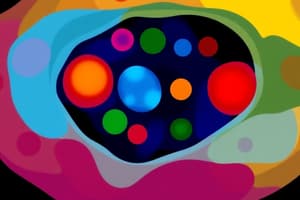Podcast
Questions and Answers
What is the primary function of the Golgi apparatus?
What is the primary function of the Golgi apparatus?
- To break down waste materials.
- To convert sunlight into energy.
- To package and ship proteins. (correct)
- To store nutrients and waste.
Which of the following statements about lysosomes is true?
Which of the following statements about lysosomes is true?
- They store water and nutrients.
- They generate energy for the cell.
- They break down waste and unwanted materials. (correct)
- They provide structural support in plant cells.
What role do vacuoles play in cells?
What role do vacuoles play in cells?
- They convert energy from sunlight.
- They package and transport proteins.
- They provide a protective barrier for the cell.
- They maintain structure and store various substances. (correct)
What distinguishes chloroplasts from other organelles?
What distinguishes chloroplasts from other organelles?
Why are organelles considered vital for cell function?
Why are organelles considered vital for cell function?
What does a scientific theory represent in the context of biology?
What does a scientific theory represent in the context of biology?
Which statement is a key part of the Cell Theory?
Which statement is a key part of the Cell Theory?
What role does the cytoplasm play in a cell?
What role does the cytoplasm play in a cell?
What is the function of the nucleus in a cell?
What is the function of the nucleus in a cell?
Which organelle is responsible for making ribosomes?
Which organelle is responsible for making ribosomes?
What is known as the powerhouse of the cell?
What is known as the powerhouse of the cell?
What distinguishes the rough endoplasmic reticulum from the smooth endoplasmic reticulum?
What distinguishes the rough endoplasmic reticulum from the smooth endoplasmic reticulum?
What is the primary function of the cell membrane?
What is the primary function of the cell membrane?
Flashcards
What is the Golgi apparatus?
What is the Golgi apparatus?
The Golgi apparatus is like a cell's post office. It packages and ships proteins to their destinations.
What are lysosomes?
What are lysosomes?
Lysosomes are like the cell's recycling center. They break down waste and unwanted materials.
What are vacuoles?
What are vacuoles?
Vacuoles are storage compartments within a cell. They hold nutrients, waste, and water.
What are chloroplasts?
What are chloroplasts?
Signup and view all the flashcards
What is the cell wall?
What is the cell wall?
Signup and view all the flashcards
What is a scientific theory?
What is a scientific theory?
Signup and view all the flashcards
Explain one key part of the Cell Theory.
Explain one key part of the Cell Theory.
Signup and view all the flashcards
What are organelles and their functions?
What are organelles and their functions?
Signup and view all the flashcards
What is cytoplasm and what is its function?
What is cytoplasm and what is its function?
Signup and view all the flashcards
What is the cell membrane and what is its function?
What is the cell membrane and what is its function?
Signup and view all the flashcards
What is the nucleus and what is its function?
What is the nucleus and what is its function?
Signup and view all the flashcards
What is the nucleolus and what is its function?
What is the nucleolus and what is its function?
Signup and view all the flashcards
What is the mitochondria and what is its function?
What is the mitochondria and what is its function?
Signup and view all the flashcards
Study Notes
Cell Theory
- A scientific theory is a well-substantiated explanation of some aspect of the natural world, based on a body of facts that have been repeatedly confirmed through observation and experiment.
- The cell theory states that all living organisms are composed of cells.
Organelles and Their Functions
- Cytoplasm: The jelly-like substance filling the cell, surrounding organelles and containing nutrients.
- Cell Membrane: The boundary controlling what enters and exits the cell.
- Nucleus: The "brain" of the cell, containing DNA.
- Nucleolus: Inside the nucleus, responsible for ribosome production.
- Mitochondria: The "powerhouse" of the cell, converting sugar into usable energy.
- Rough Endoplasmic Reticulum: Ribosome-studded, involved in protein synthesis and folding.
- Smooth Endoplasmic Reticulum: Lacks ribosomes, involved in lipid synthesis and toxin breakdown.
- Golgi Apparatus: Packages and ships proteins.
- Lysosomes: Recycling centers, breaking down waste.
- Vacuoles: Store nutrients, waste, and water; in plants, the central vacuole maintains structure.
- Chloroplasts: Found in plant cells, convert sunlight to energy via photosynthesis.
- Cell Wall: Provides support and protection for plant cells.
Importance of Organelles
- Organelles are critical for cell function.
- Each organelle has a specific job, contributing to the cell's efficiency and survival.
Studying That Suits You
Use AI to generate personalized quizzes and flashcards to suit your learning preferences.




